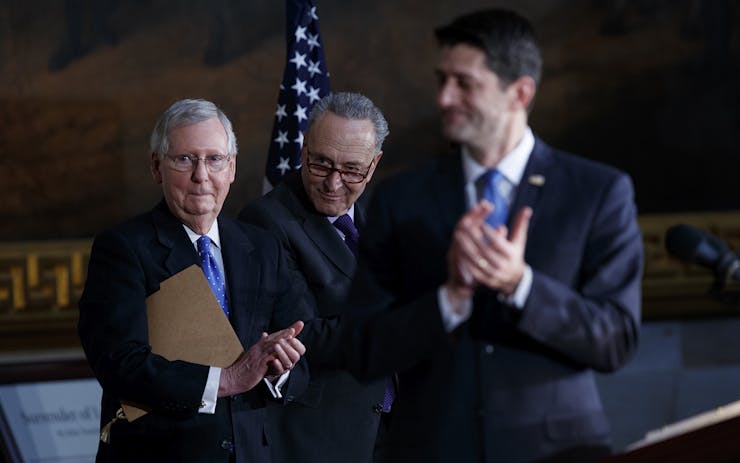Senate Democrats and Republicans came to an agreement to end the federal government shutdown on Monday afternoon. By a vote of 81-18 (60 votes were needed), the Senate passed a continuing resolution that keeps the government running for another 17 days.
The next budget vote will have to take place by the end of the day on Feb. 8, or another shutdown may ensue. Today’s deal secured six years of funding for the Children’s Health Insurance Program (CHIP) program, and rested on the promise that Congress will take up legislation regarding DACA, border security and related issues between now and Feb. 8.
Today's vote keeps federal protections for medical marijuana patients and caregivers in effect until Feb. 8.
The House passed the continuing resolution late Monday afternoon, and President Trump is expected to sign the legislation this evening.
As part of that budget deal, the Rohrabacher-Blumenauer amendment, which protects medical cannabis patients and caregivers in legal medical states, is once again in effect—but only until Feb. 8.
“I expect that during this time period, we will be maneuvering on the cannabis issue and the Rohrabacher-Blumenauer amendment,” Congressman Dana Rohrabacher (R-CA) told Leafly earlier today, as Senate leaders were brokering a deal. “So this is a time for people to make sure that they contact their own member of Congress to make sure that they get behind the amendment for the final bill.”
Rorhabacher said that he hoped Congress won’t just pass another continuing resolution on Feb. 8. “I hope that we come up with an omnibus bill that will include an appropriations bill for the Department of Justice. At that point, then we are safe for eight or nine months. Then hopefully during those eight or nine months, we will pass a regular piece of legislation that will prevent us from jumping through all of these hoops every year.”
Rohrabacher: Looking for ‘Breathing Space’
Those eight or nine months will give legislators a “little bit of breathing space” to lay down the foundation for federal law, he said. “That law will then codify the position and keep it there as a matter of record. It will also allow for people to mobilize, to get behind one piece of legislation. Then everyone can go to their elected officials and say ‘Look. This is what we are demanding’, and actually have a major push.”
Rohrabacher is pushing his own bill, HR 975, “Respect State Marijuana Laws of 2017”, which was introduced nearly a year ago and now has 40 co-sponsors (with 16 new ones since January 8).
“That bill would be putting into law the idea that the states will be the ones that will make the decision, and everybody, not just the Department of Justice, but everybody, like the banking regulators and other regulators, will then have to deal with the cannabis issue just the way they would with any other commodity throughout the states that have designated it that way,” Rohrabacher told Leafly.
'There is a new coalition out there. It's not left or right. It's a coalition of people who believe cannabis should be left up to the states.'
Today’s action leaves the industry at an interesting crossroads. Prior to the Senate deal, Vermont Governor Phil Scott signed into law the first legislature-created bill for recreational marijuana, making it the ninth adult-use state. New Jersey is poised to become the tenth, as their new cannabis-friendly governor takes office. And major pieces of federal cannabis legalization legislation are finally gaining serious traction.
“You now have people who are basing their political action today on political circumstances and coalitions and power dynamics that are decades old,” Rohrabacher told Leafly. “We’ve got to break through that, and get people to realize that there is a new coalition out there that is not Democrat and not Republican and not a left or a right coalition. It’s a coalition of people that have said that the issue of cannabis should be left up to the states, and that the reason why we are pushing for that is because we believe that there is some legitimate uses of cannabis at the very least for medical purposes but also for adults to make their own decision as to what they will consume.”
“We are going to have to create this new coalition,” he said, “and it’s very possible to do it.”




